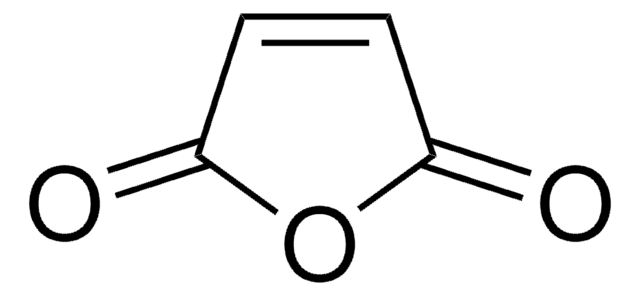912735
Maleic acid
electronic grade, ≥99.97% trace metals basis, water <=350 ppm
Synonym(s):
(2Z)-2-Butenedioic acid, (2Z)-But-2-enedioic acid, Maleinic acid, cis-Butenedioic acid, Toxilic acid
About This Item
Recommended Products
grade
electronic grade
Quality Level
assay
≥99.97% trace metals basis
form
powder
color
white to off-white
mp
130-135 °C (lit.)
density
1.59 g/mL at 25 °C (lit.)
SMILES string
OC(=O)\C=C/C(O)=O
InChI
1S/C4H4O4/c5-3(6)1-2-4(7)8/h1-2H,(H,5,6)(H,7,8)/b2-1-
InChI key
VZCYOOQTPOCHFL-UPHRSURJSA-N
Looking for similar products? Visit Product Comparison Guide
General description
Application
Maleic acid has been used in constructing polymeric solid electrolytes for battery and fuel cell. In one study, it was showen that maleic acid based polymer blend helps increasing the ionic conductivity of PEO basd polymer solid electrolytes by suppressing its crystallization.
Maleic acid has also been used to make superswelling acrylamide (AAm)/maleic acid (MA) hydrogels by free radical polymerization in aqueous solution of AAm with MA as comonomer with some multifunctional crosslinkers such as trimethylolpropane triacrylate and 1,4-butanediol dimethacrylate. When the uptake of cationic dye was studied, it was shown that the binding ratio of hydrogel/dye systems was gradually increased with the increase of MA content in the AAm/MA hydrogels.
signalword
Danger
Hazard Classifications
Acute Tox. 4 Dermal - Acute Tox. 4 Oral - Eye Dam. 1 - Skin Corr. 1 - Skin Sens. 1 - STOT SE 3
target_organs
Respiratory system
Storage Class
8A - Combustible corrosive hazardous materials
wgk_germany
WGK 1
Choose from one of the most recent versions:
Certificates of Analysis (COA)
Don't see the Right Version?
If you require a particular version, you can look up a specific certificate by the Lot or Batch number.
Already Own This Product?
Find documentation for the products that you have recently purchased in the Document Library.
Our team of scientists has experience in all areas of research including Life Science, Material Science, Chemical Synthesis, Chromatography, Analytical and many others.
Contact Technical Service



